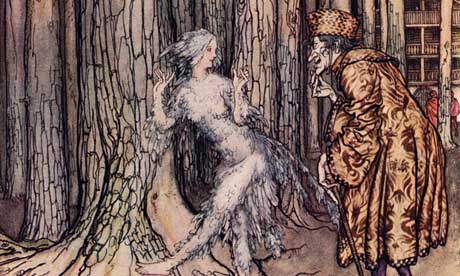 The 200th anniversary on Thursday of the first publication of the Grimm brothers' Die Kinder und Hausmärchen (Children's and Household Tales), a collection of 86 stories that became worldwide classics, is triggering a year of feverish celebrations in Germany to mark the birth of one of the most frequently read books in the world.
The 200th anniversary on Thursday of the first publication of the Grimm brothers' Die Kinder und Hausmärchen (Children's and Household Tales), a collection of 86 stories that became worldwide classics, is triggering a year of feverish celebrations in Germany to mark the birth of one of the most frequently read books in the world.Academics from around the globe, meeting this week in the central German city of Kassel, close to the brothers' birthplace, are kicking off the 2013 celebrations with a Grimm brothers' congress. Participants, ranging from lexicographers to psychoanalysts, will focus on everything from the book's enduring legacy to the brothers' impact on German grammar and how they shaped the nation's erotic imagination.
"Even during their lifetime the Grimms' book became a huge bestseller among every section of society," said Claudia Brinker-von der Heyde, the congress president. "And so they became an indispensable part of our everyday culture and our national identity."
Other Grimm events will include forest trails in the western city of Marburg where the brothers studied, light shows, art installations, cabarets, theatre productions, readings and operas.
Amid all the fanfare for the siblings who gave the world those unforgettable, childhood-defining tales of Red Riding Hood, Snow White and the Seven Dwarfs, and Rapunzel, cultural observers say the anniversary is above all a chance to examine once again a literary legacy that has often been associated with the gloomier side of German history.
In a recent essay in Der Spiegel, Matthias Matussek, one of the country's leading cultural commentators, argued that the "most successful book in the German language" offered an unparalleled exploration into the people's "dark souls", but said that most ordinary Germans had long ago fallen out of love with the storytelling masters. They were more revered everywhere else, from Asia and India to the US and elsewhere in Europe than in their native land.
"The Grimms are more popular in China than they are here," he said. "What do the others see in us that we don't see in ourselves anymore? Have we become blind because we have had an overdose of dark fairytales?"
While plenty of foreign tourists go to Bremen to soak up the atmosphere of the Town Musicians of Bremen tale, or to Sababurg's 14th-century Sleeping Beauty Castle, German interest in the tales and the paraphernalia surrounding them is remarkably limited.
Matussek, who describes the Brothers Grimm as mind doctors who "eavesdropped" on Germans' primordial joys, fears and hopes, writing as they had when memories of the 17th-century 30 years war were still strong and at a time when Napoleon was seen as the new threat to peace, says it was the Nazi era that quashed the Germans' interest in their favourite fairytales.
"Since then, the Germans have been without dreams and they'd like to ensure it stays that way," he suggested. Having a dream or a vision – if the consequence was a murderous dictatorshipwas viewed with suspicion, he said.
The theory that the Grimms' tales, particularly the more brutal ones such as How Children Played Butcher With Each Other, in which a whole family massacres itself, had an adverse effect on the German character was expressed frequently after the second world war.
In his 1978 book Roots of German Nationalism, Louis Snyder argued that the brothers helped to shape certain deleterious traits, such as discipline, obedience, authoritarianism, glorification of violence and nationalism, which became part of the national character. That was the reason allied commanders banned the book in schools after the war, arguing that they had found the roots of Nazism in the Grimms' world.
A British major, TJ Leonard, even said the fairytales had helped Germans teach their children "all the varieties of barbarousness", making it easy for them to fit into the "role of the hangman".
The German author Günther Birkenfeld saw in the fairytales the answer to "how the German people were able to perpetrate the atrocities of Belsen and Auschwitz".
The book was therefore largely banned from the German nursery – which was simultaneously undergoing its own anti-authoritarian, pro-modernisation reaction to Nazism – for decades. At the same time though, it was becoming increasingly hijacked outside Germany by Disney and Hollywood.
Matussek and others are calling for a re-think about the place the Grimm tales have in Germany's cultural identity.
But the theatre director Jan Zimmermann, who is staging a fairytale version of the Brothers Grimm biography at the Hexenkessel Hoftheater in Berlin, argued that the pair's endurance lay in the fact that they were international.
"The brothers might have written the stories up, but [the tales] had existed for 1,000 years or more beforehand as Greek, Jewish and Egyptian myths and sagas. What they did was to conserve them forever like flies in amber. It's up to us to keep them alive," he said.
No comments:
Post a Comment